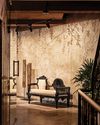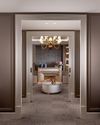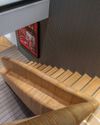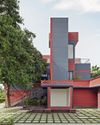The language for notable contemporary industrial projects in India is defined by the structural innovations. Continuing this philosophy, this industrial project for a processed food major at Kaharani Industrial area in Rajasthan utilises pre-tensioned precast technology to create a large span structure with impeccable finishes to comply with European standards.

Spread over approximately 210,000sq ft on a 15-acre site, the building has been planned on a 10m x 15m grid. The structural elements such as the columns, beams and slabs were manufactured at the production facility at Manesar, Haryana, and then transported to site for erection. The quality of manufacturing ensures that the precision of the elements is extremely high, resulting in a superb interior finish. This technology also ensures that the time taken for erection is much less than conventional systems and uses substantially less manpower. This technology has high relevance for buildings with replicated modules such as schools and colleges, and we are currently designing several proposals for educational buildings based on this technology.
The project is a zero-discharge unit and has been designed to be extremely frugal in resource consumption. All the liquid wastes are recycled or used in irrigation. The project uses a vacuum distillation unit to extract substantial amounts of RO quality water from RO wastes and WTP backwash water. The building is completely insulated and even though the wall work is in AAC blocks, further efficiency has been achieved by using 100mm thick EPS to almost eliminate heat gain.
The production areas are lit up with linear skylights eliminating the requirement for artificial illumination during most production hours. The roofs have been laid on a slope to ensure that there are no rainwater pipes in the production facility, rather edge gutters drained by state-of-the-art syphonic drainage systems have been implemented for rainwater drainage.
This story is from the March 2017 edition of Architecture + Design.
Start your 7-day Magzter GOLD free trial to access thousands of curated premium stories, and 9,000+ magazines and newspapers.
Already a subscriber ? Sign In
This story is from the March 2017 edition of Architecture + Design.
Start your 7-day Magzter GOLD free trial to access thousands of curated premium stories, and 9,000+ magazines and newspapers.
Already a subscriber? Sign In

A GRECIAN RETREAT
Shimona Bhansali imbues a subtle touch of opulence to this home in Mumbai

A BOLD STATEMENT
Dhampur Sugar Mills Limited's workspace in New Delhi designed and built by Officebanao adopts an industrial narrative

A BREATH OF FRAGRANT DESIGN IN DELHI'S HEART
An office that smells like perfumery; that is the vision that TWI brought to life in this office space designed for an acclaimed perfume company in India

MASTER OF ALL TRADES
The ethos of forward-thinking and ingenuity finds its architectural counterpart within the walls of Nikhil Kamath and Abhijeet Pai's office-a vision of organic design infused with the essence of India

A TOUCH OF OPULENCE
Designed by Aparna Kaushik, this Delhi office displays an interesting balance of classic aesthetics and contemporary sensibilities

THE WOODEN WONDERLAND
Priyanka and Piyush Mehra envision a stunning experience centre for Vikas Plywood

THE HUB: BUILDING COMMUNITIES
Studio Lotus designs a dynamic mixed-use community hub that activates Chennai's largest IT Park

THE WINNER'S PERCH
Baldiwala Edge designs a Singapore-based ship broker's office as a torch collector's paradise, offering a 360-degree bird's-eye view of the Mumbai skyline

THE DIRECTOR'S CABIN
Designed by Envisage, this office gives a new definition to the traditional notion of biophilia

Designing Corporate India
From weaving the magic of a Star Trek-themed command centre to crafting bespoke block-printed workstations, Vijaya Bhargav and Arnab Ghosh-the trailblazing co-founders of Ostraca-have astonishingly transformed a staggering 29 million square feet of office space for India's tech giants and global enterprises-all while maintaining a flat hierarchical company culture-fuelling a master class in corporate design